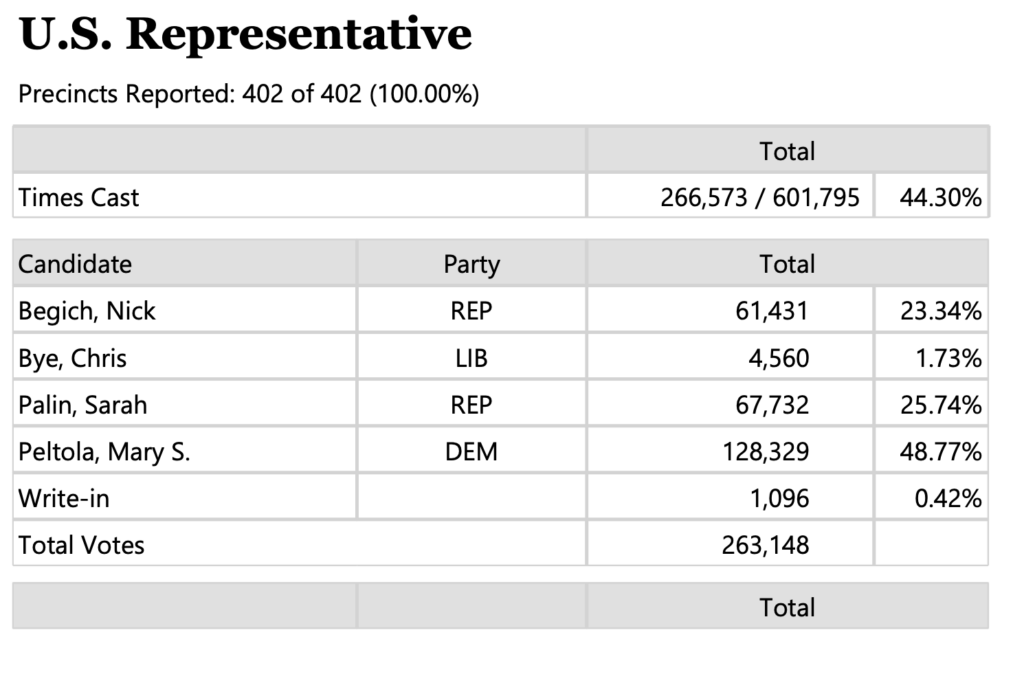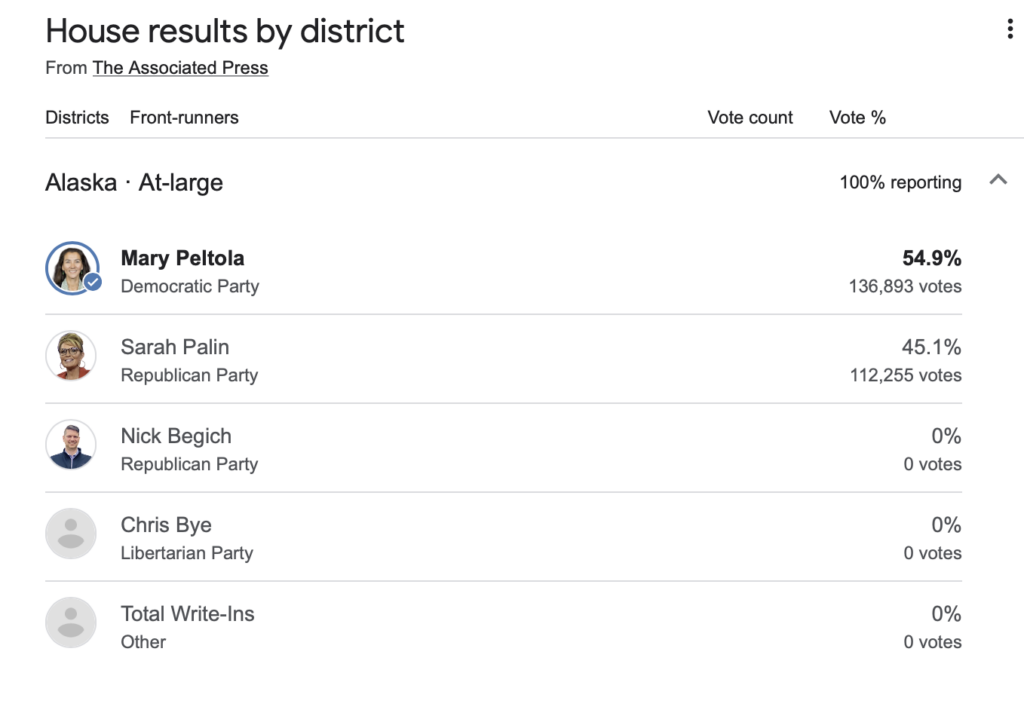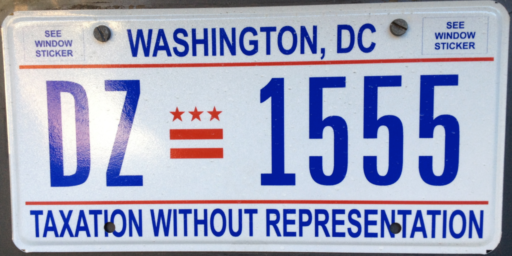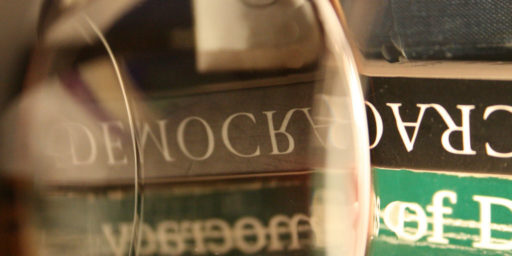On Spurious Majorities and Other Thoughts on Electoral System Critiques
Because sometimes the comment box is just too small.

Note: as with most posts like this that start as a prompted by a comment elsewhere, this is just a chance to say (and, yes, re-say in some cases) things that were already on my mind.
So, as it often the case, a conversation in a comment thread leads me to want to write more than just make a comment, so here we go. In James Joyner’s post on Palin’s loss in her bid to win a House seat in Alaska, commenter Andy noted “you can’t assume vote totals would be the same in an election under a different set of rules” (see the the thread for greater context if desired). The comment was aimed at James, but I was name-checked and noted that, of course, I understood this.
To expand: rather obviously one of the the great impossibilities of political science is that you can’t run experiments the way the natural sciences can. We cannot, for example, run the 2022 election over again with different electoral rules to see how those rules would change outcomes. All of us who study these things clearly know this. But, it is also known via comparative study across space and time is that electoral rules (in the simplest of terms, how votes are translate into offices) profoundly effects voter and politician behavior and that, therefore, it is almost certainly the case that different rules would produce different outcomes.
So, I am supremely confident that while I cannot rerun 2022 under different conditions to prove specific outcomes the way a chemist can combine different compounds in a lab that if the US had a different electoral system, it would have a different party system. Indeed, as a general proposition is it clear that changes in incentive structures as manifested by alterations in rules of games changes behavior (and politics is but a massive, highly consequential game).*
Now, I recognize that things like national political culture and historical development also have an effect. But there is a lot of evidence that has been amassed over the last century-plus of representative democracy worldwide that plainly show that the electoral system is a major variable in shaping party systems and the overall nature of political behavior in a given system. Put another way, I recognize that electoral rules are not the only variable and that this is a complex discussion.**
As such it is is possible to look at a given system, and I primarily look at the US system here at OTB, and make some assessments as to where democratic decencies may lie, even if one cannot know in a controlled experiment kind of way what precise changes that systemic chance would produce.
I will add, in case it is not clear, that changes in rules take time to produce changes. While we do normally see some level of reaction in a party system almost immediately at the margins, existing candidate and voter behaviors take several cycles to fully evolve.***
This leads me back to comment from Andy in the interchange in the linked thread.
@Andy:
Yes, you understand this,**** but still continue to use aggregate vote totals to suggest that partisan disparities in representation are unfair.
This is a reference to an observation I have made that our system can produce outcomes wherein the national vote, in the aggregate, can favor one party and yet the opposite party can win control of the House (for example, Another Example of Our Flawed Democracy).
As such I point to aggregate vote total to provide evidence that the electoral system does not do an adequate job of reflecting actual public sentiment. Or, depending on the conversation, that such outcomes demonstrate a flaw worthy of consideration and correction. This is not, I would note, suggesting that under a different set of rules all the votes would be cast the same way, quite the contrary, in fact, as under different rules I would expect more parties.
I (and other who’s study these things) would suggest that a spurious majority is a systemic problem wherein the aggregate vote totals show support for Party A, but Party B gets the majority of the seats not because of registered voter preference, but because of some design issue in the system. At a bare minimum, legislative elections ought to give the majority of the seats to the party that has majority support in the population if the goal is national representation, which is the alleged goal of the House of Representatives.
Yes, I realize that part of the reason we get weird results in the US that makes the aggregate vote an imperfect metric is that we have a lot of uncontested elections (which is another sign of an unhealthy system). I also recognize that regionality could influence these outcomes (but not enough to undercut my basic point, although I am open to an evidence-based counter on this topic). But even if regional variation leads to some of the distortions that does not mean that the national legislature shouldn’t reflect those variations as closely as possible unless a state/region was truly 100% blue or red, which is simply not the case.*****
I would note that if we used Mixed-Member Proportional Representation (MMP) such as in Germany and New Zealand the shape of the House would reflect the proportional support of the parties on a national basis while also still having district-level Representatives as well. These things are doable without going to the extremes and electing the whole legislature on a national basis as is the case with the Israeli Knesset. But, of course, even if we elected the House in moderately sized multi-seat districts using open list proportional representation (OLPR) we would get a pretty close fit between the general national preference and the representation in the House.
I am as certain that the existing electorate would produce a different party system under either MMP or OLPR as I am about a host of concrete natural science claims. It would not be immediate, as it takes times to adapt to new rules and incentives, but it is quite clear that human being adapt to new rules and incentives and, moreover, there is vast evidence that changes to the electoral system changes the behavior of politicians and of voters. It has been observed over and over again.
I am not suggesting that such a circumstance would fix all of the pathologies of American politics or forestall the development of new ones. But I am claiming that moving in the direction I (and many others) have suggested would directly address some of problems clearly being created by only having two viable choices at the ballot box as well as the problems the emerge when the majority of the population actually isn’t allowed to govern as a result of the rules (which leads us back to why things like spurious majorities are evidence of a problem, alongside Electoral Vote/Popular Vote inversions and the fact that the Senate allows a distinct minority of the population to have well outsized influence on policy).
I note these things because they matter if we take representative democracy seriously. Representative democracy should, in fact, be broadly representative of the interests of the population (with, of course, fundamental protections of minority rights enshrined).
A different way of thinking about this is simply to ask if we believe that, in fact, the US House of Representatives really is a good and adequate reflection of the interests of the population or not. If one thinks it is, or is close enough, then I suppose all of my writings on this come across as more than a bit loony (or, at least, Academic Yells at Clouds).
But let’s return to Alaskas and Andy’s comments:
In this particular case, to use your logic as I understand it, more people voted for Republican candidates, yet a Democrat won, hence that is a spurious majority.
So, “this particular case” is Alaska’s House race, wherein the first round of voting looked like this:

And the second count looked like this:

The result is not spurious (indeed, quite the contrary) because there was a fair mechanism that allowed voters to register their preferences. I will say that if first round results were a consistent feature of Alaskan politics, i.e., that a majority of voters wanted an R, but a D was consistently elected, then I would say, yes, the system, needs a corrective.
One corrective might be a run-off (as we are seeing in Georgia). Another would be RCV, which is what Alaska has chosen to do. In this case, it is clear that while more voters (49.08%) preferred Republicans in the first round, when given the chance to indicate their ranked preference, they really wanted the Democrat.
(And as we would expect in a run-off situation, a candidate that scored that close to 50% in the first round with the second-place finisher so far behind, that the winner of the first round wins the second).
Still, the Alaska election is making my basic point: the rules matter as a mechanism for translating mass preferences via voting into office-holders. A different set of rules with the same voters (to one of Andy’s points) would likely have produced a different outcome. The goal should be construing the rules in a way that best reflects voter preferences at a mass level.
On a micro-level, this is what I am stating should be a normative preference: that a mechanism is needed to allow majority preference to be reflected in government and that the rules ought to be oriented in that direction.
I would stress that the way this is accomplished in a single-seat race and the way this is accomplished nationally are two different things. One seat cannot be sub-divided in a proportional manner, while 435 seats can be.
The problem with a spurious majority as it pertain the a whole legislature is that it is evidence that the public is not being adequately represented because what it wants in the aggregate is not being translated into specific seat outcomes. Spurious majorities are a sign that that system may be flawed from a democratic theory point of view, especially if that outcome becomes regularized.
Aggregate vote totals on a national scale should matter because they are an empirical measure of the preferences of the population. And while I am not advocating for a simplistic majoritarianism, I am saying that it holds to a reasonable theory of democracy that the legislative body that is supposed to represent the people should reflect the preferences of those people as much as possible.
Let me close by quoting Henry Droop from 1869 on his preference for proportional representation over the US’ single-seat district system:
It will, I believe, hardly be disputed, that the claim of a representative assembly to have the decisions of a majority of its members accepted as the decision of the whole country, depends upon the theory that these decisions do in general correspond to what the majority of the whole body of electors in the country would decide, if they had leisure sufficiently to investigate each of the questions to be decided, and an opportunity to vote upon it.
[…]
…a representative assembly in which all parties and sections of parties and all diversities of opinions are represented proportionally, will be much easier to deal with, than an assembly in which the particular differences of opinion upon which the division into two parties is founded, are represented to an exaggerated degree, while subordinate divisions of parties and the various opinions existing upon other questions are only represented by the chance opinions of individual members, and not by members authorised to speak upon these points in the name of their constituents.
On the two party system, the following from that essay is quite prescient given our current polarized times:
As every representative is elected to represent one of these two parties, the nation, as represented in the assembly, appears to consist only of these two parties, each bent on carrying out its own programme. But, in fact, a large proportion of the electors who vote for the candidates of the one party or the other really care much more about the country being honestly and wisely governed than about the particular points at issue between the two parties; and if this moderate non-partisan section of the electors had their separate representatives in the assembly, they would be able to mediate between the opposing parties and prevent the one party from pushing their advantage too far, and the other from prolonging a factious opposition. With majority voting they can only intervene at general elections, and even then cannot punish one party for excessive partisanship, without giving a lease of uncontrolled power to their rivals.
Emphasis mine.
I am sure that doesn’t sound familiar at all.
The link is from an essay about Droop’s though by my friend and co-author on several occasions, Matthew Shugart’s blog, Fruits and Votes. I would note that Matthew is one of the most preeminent scholars of comparative electoral systems and his blog (and academic writings) are worth exploring for those who are interested in the topic.
To conclude: I believe in representative democracy as the best option human beings have to govern themselves.****** I think this is true both normatively and empirically.******* And I think that there are multiple signs that US institutions are under-performing in this arena, owing largely to relying on antiquated institutions (something that Henry Droop recognized in 1869!). And while I understand that change would not produce nirvana, it would improve our government and therefore it would be worthwhile.
And yes, I know it would be hard to accomplish (if not impossible). Still, I will press on to try and convince as many people as possible that the status quo can be changed and should be by pointing out broader issues (as per the above) or simply pointing out that the House is too small.
And now back to your regularly scheduled blogging, already in progress.
*For example, the NFL is a more pass-focused league than it used to be as a result of rules changes as to what defenses can, or cannot, do. The evolution of defensive pass interference rules and roughing the passer rules, to name two, have changed behavior in the game.
**Allow me a moment of footnoted cantankerousness to note that I am engaging in a lot of these caveated asides (here and in other posts), like acknowledging that yes, things are complex, and yes change is hard, because a lot of the time the objections I get in these discussion is along these lines rather than to the broader substance.
***For example, Colombia’s electoral reform in 1991 did not immediately derail the Liberal Party from its dominant position. This took several cycles and now the Liberals are far smaller as the new rules incentivized, and rewarded, new party formation. (And further reforms in 2003 were relevant to that transformation as well).
****”This” meaning “you can’t assume vote totals would be the same in an election under a different set of rules.”
*****I mean, sure, CA is heavily Democratic, but there are still millions of Republicans there as well.
******I do think ascribe to the quote attributed to Churchill that “democracy is the worst form of government there is except for all the others that have been tried.” In may ways, the whole of political philosophy going back to Plato is about this question.
*******I think that the values (the normative side) of valuing individuals and promoting rights and liberties in the context of power being governed by the vote is superior to other kinds of power. And empirically, it is factually the case the human flourishing is better in democratic rather than non-democratic systems. (And gosh, yes, the multiple asterisk system of footnotes gets a bit silly after a while).






I’m pretty sure you’ve said all of this before, just not in a single post. Thanx for putting this together.
As I’ve noted in a couple of posts in the Alaska returns, the fact that we had essentially the same first-round vote total and three different results in the three contests tells is something. The Republican governor won re-election without a runoff. The Republican Senator was re-elected, has the first-ballot plurality, but required the instant runoff. The Democratic Representative had the first round plurality but only won re-election because 8000ish folks who preferred the 3rd place Republican preferred her over the 2nd place Republican. That seems a rather clear statement of voter preferences.
@James Joyner: The fact that the voters faced the same choices two months ago in the House, and made the same choices this time also suggests that it was a clear statement of voter preferences.
I was honestly expecting a Palin victory this time, because of people regretting the election of a Democrat a few months back — that the RCV, being different and new, was too complicated for many and they didn’t think through the consequences.
(Years of sitting in on UX testing sessions has taught me to never assume people understand anything)
I do wonder whether the Palin voters’ second choice would have been split so in favor of Begich over Peltola that it would have resulted in a different outcome had her voters been pushed to their second choice.
Given three candidates, D, R and R-Insane (I’m not going to remember their names anymore), I’m not sure splitting the middle dude’s votes really reflect voter preferences. Had it been D vs. R, R might have won by more than D wins in D vs. R-Insane.
I shudder to think of how complicated a system would have to be to get that outcome — I would almost want to let candidates haggle over who drops out, in what order, but only because I love chaos.
Anyway, I think there’s a good chance that Palin was effectively a spoiler and cost a seat for the Republicans. I can’t find data on Palin voter second choices to confirm it though.
@Gustopher:
But it seems pretty clear that of the three options, the voters preferred the D.
All you can hope for is a system that allows voters’ overall preference to prevail.
Indeed, I am not sure how sp”splitting the middle dude’s votes” is anything other than a metric of the electorate’s preference.